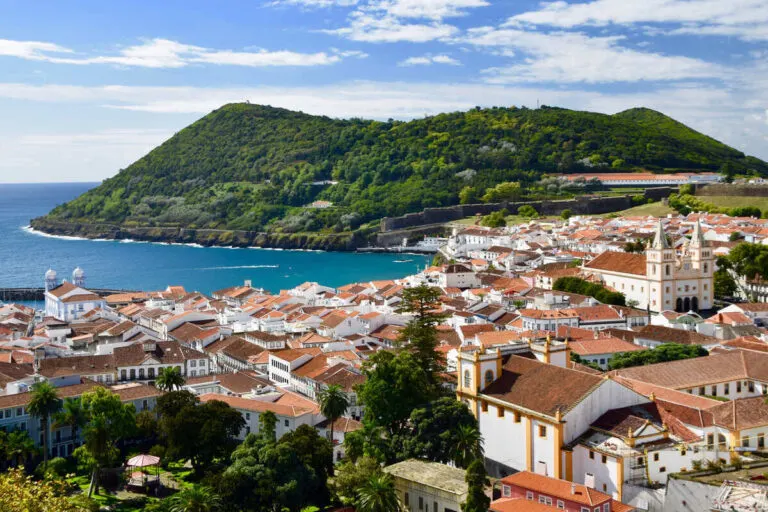One of the top summer hotspots this year, Portugal seems to be on every American traveler’s radar lately, with its gorgeous cities dating back centuries and extensive Atlantic Coast interspersed with historic fishing villages and sandy beaches.
From the lively Porto down to a hilly Lisbon, and further south to the Algarve, arrivals have been on the up, but there’s this secondary Portuguese destination in particular, that despite not being part of mainland Europe, is seeing a significant uptick in U.S. visitors.
The Azores, a collective of nine islands full of turquoise lagoons and epic hikes that used to be Portugal’s best-kept secret is bracing for record tourism this season, and this is why:
What’s So Special About The Azores?
The Azores is both an autonomous region of Portugal, and an archipelago in the middle of the North Atlantic that is located 2230 miles from the Portuguese mainland; despite their remoteness, the islands are part of Portugal and belongs geopolitically to Europe.
There are nine in total, each of them with their own defining traits, geological features and culture, and getting around the archipelago is fairly easy thanks to the cheap daily flights between some of the largest islands, and ferry routes linking island groups.

Home to over 60% of the archipelago’s 240,000-people-strong population, as well as the Azorean capital Ponta Delgada, São Miguel is the busiest island for tourism, concentrating a majority of foreign arrivals:
One Of The Cheapest Sunny Islands In Europe Is A 5-Hour From Newark
It is famous for its ruggedness, waterfall-dotted forests and serene beaches, and it is where most Americans visiting the Azores will land, as it hosts 5h30 nonstop flights from Newark, making it the shortest Transatlantic route leaving from the West Coast.

The Azores is also one of the cheapest sunny getaways in Europe, in line with the rest of Portugal: excluding Transatlantic flights, accommodation, food, intra-Azores transportation (flights between islands) and tourist attractions all included will set you back by an average $1,038 per week.
Dining out is particularly cheap, especially in rural settings, where family-owned guesthouses with restaurants attached have lunchtime menus including a salad, main dish and soft drink for $15, and Portuguese pastries purchased from local pastelarias are all under $2.
This is your chance to gorge on some volcanic salt-sprinkled, lime-sprayed bacalhau fish, and as many of those addictive custard cream tarts you can get your hands on, without breaking the bank, as delicious Michelin-worthy food in the Azores is not a privilege for the wealthy few.
As for those Newark-Ponta Delgada flights, they start from as cheap as $532 this season, though if you’re in Portugal already, flying 2h15 from Lisbon, the country’s capital, to the main hub of the Azores can cost a negligible $28.

Accessibility and affordability are not the only reasons why Americans are flocking into this less-known Atlantic paradise, however, so much so that they have already slightly surpassed German tourists, formerly the Azores’ main market:
Pick Your Island
São Miguel is gorgeous, indeed, but there is a reason why this is called the Hawaii of Europe, and from geyser-peppered volcanic islands traversed by majestic peaks, to crystal-clear lagoons and lush-green forests, there is an entire world waiting to be discovered.

Depending on your travel preferences, and whether you’re here for the culture or an escape into nature, you’re likely to be drawn to two or three specific islands, and lucky for you, they are usually a 30-50 minute flight away from each other.
Once you’ve seen all that São Miguel has to offer, you can pick from:
Corvo
The smallest and most remote of the Azores islands, with less than 400 habitual residents, Corvo is a UNESCO-inscribed Biosphere Reserve popular for its many natural saltwater pools, which are fenced off from the wild Atlantic by volcanic formations, and a landmark 300-meter crater.

Faial
The Westernmost point of the Azores, and thus Europe, Faial is characterized by its well-delineated hiking paths, dormant volcanos, yacht-lined marina and charming, Baroque main settlement Horta, where a majority of the 15,000 islanders live.
Flores
Yet another UNESCO World Heritage Site, the aptly-named Flores is covered in thousands of colorful hydrangeas that line he sides of narrow roads, leading from one coastal village to another, and up to seven deep-blue or emerald-green lakes resulting from volcanic activity: the original Eden is here.

Graciosa
The third UNESCO-listed preserve on this list, Graciosa, or the ‘Gracious One’, is the wellness destination of the Azores, highly sought-after for its thermal baths and the imposing Caldeira da Graciosa, a crater formed thousands of years ago.
Pico
If you’re an enthusiastic hiker, then you’ll love Pico: it is where you’ll find the tallest mountain in all of Portugal, towering 2,000 meters high above sea level, as well as some of the country’s best-reputed wineries, with grapes maturing black volcanic soil.

Santa Maria
The warmest island in the Azores, enjoying spring-like temperatures year-round, Santa Maria is easily distinguishable from the rest due to its sun-kissed golden sands, teal-colored seas, and dry, desert-like hinterland (it’s also only 50 miles from São Miguel).
São Jorge
Not far away from both Faial and Pico, São Jorge is an offbeat alternative to the most popular island circuit that is the proud owner of a rare European coffee plantation, nature-made pools, and quaint villages nestled amid verdant landscapes.

Terceira
The last island on the list, Terceira is best known for the UNESCO-protected capital Angra do Heroísmo, a historic whitewashed port founded as early as 1534, with a maze-like, cobbled Old Town, though its scenic viewpoints and sulfur baths are equally big draws for island-hoppers.
Credit: Source link


